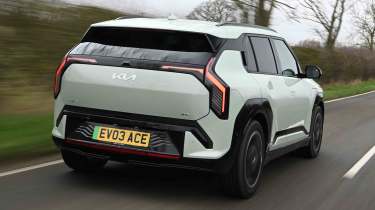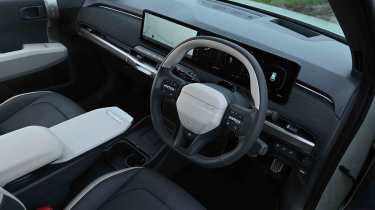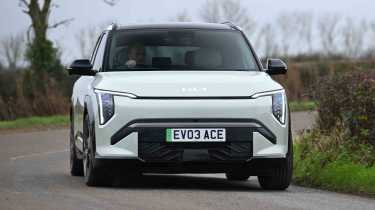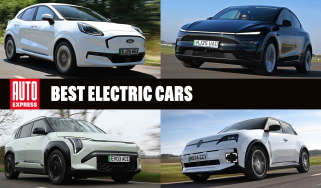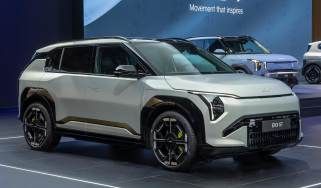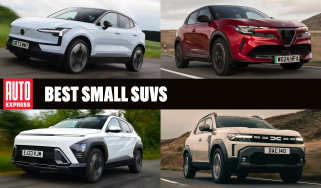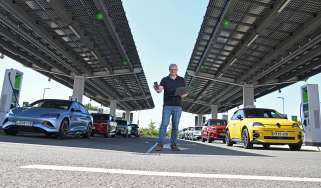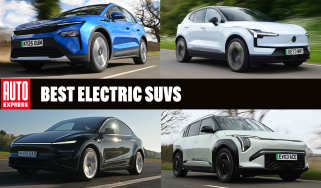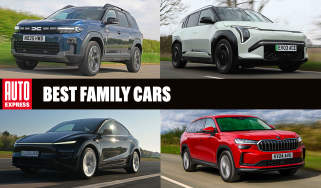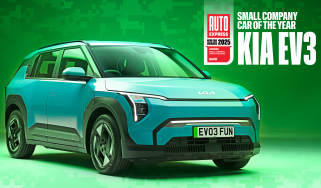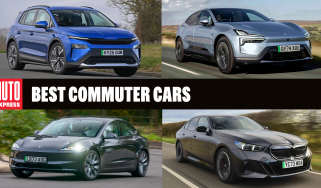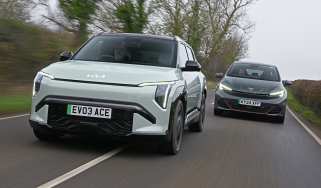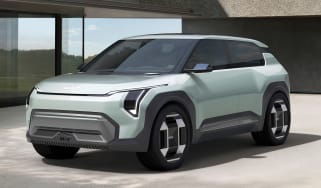Kia EV3 review
The stylish Kia EV3 compact electric SUV offers a long range, a practical boot, and good passenger comfort

Our opinion on the Kia EV3
Kia’s purpose-built electric cars are named in multiples of three, but it doesn’t mean that the Kia EV3 is one-third the car of the flagship Kia EV9. And while it doesn’t get the 800-volt architecture of the seven-seat SUV (or the Kia EV6 that sits between them), it doesn’t skimp on battery capacity or in-car tech.
In terms of price and size, the Kia EV3 looks similar to Kia’s existing entry-level electric car, the Kia Niro EV. The Niro will continue in all three of its powertrain forms (hybrid, plug-in hybrid, and fully electric), but in the case of the latter, most buyers will find the EV3 the more attractive option in most areas, especially in terms of overall range and cost – both qualities that contributed to the EV3 being named our best small company car choice in the 2025 new car awards..
About the Kia EV3
The EV3 is part of an ever-growing line-up of electric cars, showcasing Kia as a specialist in EV technology. Its more affordable price compared with the EV6 and EV9 is reflected in slower charging times, and it offers greater practicality than the Kia EV4 hatchback and its fastback sibling. Oddly, the EV3 rather treads on the toes of the Kia Niro EV, which has a slightly bigger boot and offers similar space inside to the EV3, but has a much smaller battery and, therefore, less range, and it costs more to buy.
Used - available now

2026 KIA
EV3
5,223 milesAutomaticElectric
Cash £32,999At a later date, Kia will introduce the Kia EV3 GT, a high-performance variant that is likely to have a twin-motor set-up for four-wheel drive, and will most probably have a shorter range than the launch models. At the moment, the current line-up is all front-wheel drive.
We've tested the Kia EV3 against its key rival, the Cupra Born, and found the EV3 wins out over the Born thanks to it longer real-world electric driving range, its large boot, excellent ride comfort, outstanding warranty package, and impressive value for money.
Kia EV3 prices and latest deals
How much does the Kia EV3 cost? Well, official ‘on the road’ prices range from £32,995 to £42,995 but you can currently save an average of £2,712 through the Auto Express Find A Car service, where prices start at £30,961. You can lease a Kia EV3 from £364 per month or buy a used model at prices starting from £32,999.
Check out our latest new car deals, leasing deals and used car deals for the top offers available now on Auto Express. And don't forget we can help you sell your car, too.
Performance & driving experience
| Pros |
|
| Cons |
|
Kia has kept things fairly simple with the EV3’s powertrain, with a choice of two battery capacities, both paired with the same motor.
It’s not particularly fun to drive, but that doesn’t really matter for a car such as this. Kia has instead focused on comfort for the EV3, and it’s done a solid job of delivering on its aims.
As with most new cars, the EV3 has a range of drive modes. The throttle response offers a choice of three settings and the steering comes with two, but we struggled to find a reason to use them.
Performance, 0-60mph acceleration and top speed
The sole electric motor option currently available in the EV3 makes 201bhp and 283Nm of torque – not class-leading figures but more than good enough for a fairly compact family car.
The entry-level model’s smaller, lighter battery pack means it’s actually the quicker car, albeit only just; it covers the 0-62mph benchmark in 7.5 seconds compared with the long-range model’s 7.7 seconds (or 7.9 seconds when fitted with 19-inch wheels). Even driving the pair back to back, that difference in performance is negligible.
Throttle response is well judged, making the EV3 feel lively without being too jumpy or hyperactive. A nice, linear shove gets Kia’s newcomer up to the national speed limit with ease, but we’d appreciate a little more urgency when attempting overtakes.
| Model | Power | 0-62mph | Top speed |
| 58.3kWh Air | 201bhp | 7.5s | 105mph |
| 81.4kWh Air | 201bhp | 7.7s | 105mph |
| 81.4kWh GT-Line S | 201bhp | 7.9s | 105mph |
Town driving, visibility and parking
EV makers have come up with many ways to let drivers adjust the rate of regenerative braking, and Kia’s iPedal set-up is one of the best. The EV3 has paddles on the steering wheel that can be adjusted on the fly to deliver just the right amount of deceleration.
The options range from full coasting to one-pedal driving, with an adaptive mode that decides how much regen is needed based on road and traffic conditions. This, combined with well-weighted and accurate steering, makes the EV3 a very easy car to drive at low speeds, while the soft suspension does a decent job of soaking up most bumps.
Country road driving and handling
That cushioned suspension works well at higher speeds, too, where the EV3 still provides a fairly relaxed environment for occupants. The flip side is that the Kia isn’t particularly fun to drive; it’s not as lifeless as a Hyundai Kona, but the Renault Megane E-Tech and Cupra Born offer much more sharpness without too much compromise in comfort.
The softer set-up also means that any big compressions make the hefty kerbweight all too apparent, because the springs and dampers struggle to contain the forces they’re having to deal with. It’s a car that is geared towards driving at a more relaxed pace.
Motorway driving and long-distance comfort
The fairly soft set-up creates a relaxing motorway mile-muncher. While the performance tails off somewhat over 60mph, there’s still enough torque in the motor to make the EV3 feel completely at home at motorway speeds. Road noise becomes a little audible the faster you go, but it remains slightly more hushed than a Cupra Born, for example.
"While Sport mode makes the throttle feel sharper and more responsive, it doesn’t make the car any faster. The difference between Comfort and Eco, meanwhile, is almost impossible to feel. Likewise, the Sport steering setting adds a little weight, but the difference is so small that it hardly feels worth the effort." – Alex Ingram, chief reviewer
Range, charging & running costs
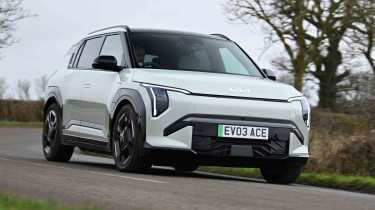
| Pros |
|
| Cons |
|
Electric range, battery life and charge time
We’ve driven the EV3 in very different climates: once over the course of a chilly week during the UK winter, and another, much warmer encounter in South Korea. These drives highlighted just how much of an effect temperature has on the car’s range; we achieved 3.3 miles/kWh during a British cold snap, which translates into a 270-mile real-world range for the long-range model. That includes the power draw from the generous heating we used, and the lack of an efficient heat pump in all but the top-spec model no doubt had an adverse effect. If you want to mitigate the effects of the cabin heater, a heat pump is offered, but only as an option on the top-spec GT-Line S model. It adds around £900 to the car’s price.
But in the mid-20s temperatures in South Korea, we registered 4.6mi/kWh, increasing the range by more than 100 miles. Regardless of the weather, this Kia’s range is among the best for a car of this size and price.
Officially, the longer range 81.4kWh battery EV3 charges at 127.5kW, which is about average for this class. However, we found during our charging speed test that it could maintain close to that charging speed for around 20 minutes, helping to add a 50 per cent charge to the battery in that time. This backs up the manufacturer’s claim that a top up charge of between 20 to 80 per cent state of charge should take around 30 minutes. After this, the peak charging speed drops significantly, although a 28-minute charging time from 80 to 100 per cent certainly wasn’t the worst on test. Our advice is to unplug at around 80 per cent state of charge and carry on to your next charging point, if you need to, in order to save time.
The standard range 58.3kWh version has a lower peak charging speed, so despite having a smaller battery capacity, it’ll still take around 30 minutes to top up from 20 to 80 per cent state of charge.
If you have the luxury of being able to charge up at home using a typical 7.4kWh wallbox charger, it’ll take just under nine hours to fully recharge the 58.3kWh model, and around 12.5 hours to do the same with the 81.4kWh version.
The EV3’s battery is covered by an eight-year/100,000-mile warranty, which guarantees that the pack will maintain at least 70 per cent of its original capacity once it reaches that time or distance.
| Model | Battery size | Range | Insurance group |
| 58.3kWh Air | 58.3kWh | 270 miles | 32E |
| 81.4kWh Air | 81.4kWh | 375 mile | 34E |
| 81.4kWh GT-Line S | 81.4kWh | 362 miles | 36E |
Insurance groups
Insurance groups for the EV3 start in group 34 for the base Air model with the Standard Range battery, while Long Range cars sit in groups 36 to 38, depending on trim.
That’s a little high compared with the competition, with the Cupra Born and VW ID.3 both starting in group 24, while Kia’s own Niro EV starts in group 28.
Tax
The electric powertrain is sure to make the EV3 an appealing choice for company-car drivers, and slips into the three per cent Benefit-in-Kind (BiK) tax band. At the moment, it attracts a three per cent rate, but this will rise to four per cent for the ‘26 to ’27 tax year, and five per cent from ‘27 to ‘28.
Owners of EVs no longer enjoy free vehicle excise duty (VED) road tax, but at least the EV3 range avoids the luxury car tax surcharge because it drops below the revised £50,000 threshold for EVs (raised from £40,000 and comes into effect from 1 April 2026, although it applies retrospectively to cars registered from 1 April 2025).
EVs would also be subject to an eVED pay-per-mile fee if that comes into force from April 2028 onwards.
Depreciation
After three years or 36,000 miles, data sourced from CDL VIS predicts that the EV3 will retain between 45 to 48 per cent of its original price. That’s a little better than the Cupra Born (41 to 45 per cent) and similar to the Volkswagen ID.3 (40 to 48 per cent), but is a few percentage points behind more premium alternatives such as the Elettrica version of the Alfa Romeo Junior, which maintains between 50 to 52 per cent of its value.
For reference, one of the heaviest depreciators in the segment, the Vauxhall Mokka Electric, holds on to between 33 to 35 per cent of its original cost over the same period – although the high performance Mokka GSE version is an outlier by retaining 45 per cent of its original value.
To get an accurate valuation for a specific model, check out our free car valuation tool...
Interior, design & technology
| Pros |
|
| Cons |
|
Colours are an entirely subjective thing, but it’s a bit of a shame that Kia has been so conservative with the EV3’s exterior palette when its edgy lines would really suit a more lively paint finish. While there is a green, a blue and a red, they’re a bit flat and dreary, and even then, most are limited to a specific trim level. Besides those options, it’s monochrome all the way.
The cabin is modern and largely sound ergonomically, bar the odd placement of the start button that takes some getting used to and the climate control screen that’s obscured by the steering wheel.
Standard equipment is generous even for our preferred Air entry-level model trim, with:
- LED lights all around
- Auto lights and wipers
- Keyless entry
- Heated seats
- Twin 12.3-inch digital displays
- Adaptive cruise control
- 17-inch alloy wheels.
Moving up to GT-Line adds gloss black exterior details, wireless smartphone charging, sliding centre console storage, an electrically adjustable driver’s seat and a digital key, so you can use your phone to unlock the car.
The top-spec GT-Line S loads up the extras, with a sunroof, ventilated front seats and heated rear seats, a powered tailgate, a head-up display, a Harman Kardon sound system, 360-degree cameras and remote parking.
Interior and dashboard design
The EV3 takes plenty of design inspiration from its bigger EV range mates, with the fundamental dashboard layout and a variety of details that will look familiar to anyone with experience of the Kia EV6 or Kia EV9.
The largely uncluttered layout strikes a decent balance between physical controls and touchscreen interfaces. You might be hunting for the starter button at first, but it’s located on the column-mounted gear selector, which seems perfectly logical once you’re used to it.
Higher-spec models get a sliding mini-table between the front seats, which pops out from under the armrest. Yet it feels too small to be particularly useful, and we’d prefer to have the extra storage space that Air trim has instead.
Materials and build quality
The cabin feels solidly put together, although some rivals feel just a little posher inside, because there are a few too many hard, scratchy plastics falling close to hand.
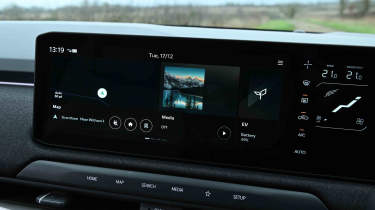
Infotainment, sat-nav and stereo
When it comes to standard-fit tech, it’s hard to look beyond the entry-level Air trim since it has the same 12.3in infotainment screen and sat-nav system as its pricier siblings. If you want wireless smartphone charging, then the GT-Line is the model to have, while the GT-Line S adds more luxurious features such as a head-up display and a beefier sound system from Harman Kardon.
While the EV3’s infotainment system isn’t as bold or as colourful as the systems found in some rivals, for the most part the layout is logical and easy to work out. The one exception to this rule is the driver-assistance menu, where the sub-menus are scattered around the image of a car, when a simple list would be much easier to figure out.
Loading times are reasonable, if not class leading, but for the most part, Kia has taken a sensible approach with the infotainment that shouldn’t irritate too many users.
"The climate control screen’s location is a serious oversight in my view. It’s almost impossible to change any settings without taking your eyes off the road ahead, because the steering wheel practically obscures the entire display.” – Shane Wilkinson, senior content editor
Boot space & practicality
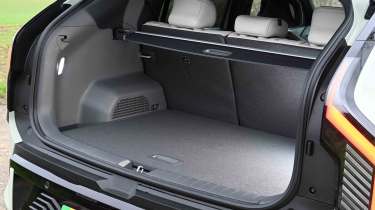
| Pros |
|
| Cons |
|
The interior space of the Kia EV3 isn’t the best in the segment, but the shortfall in rear passenger space has been put towards the boot, which is generous for a car of the EV3’s size.
Dimensions and size
The Kia EV3 is shorter than the firm’s Niro, but it’s wider and taller, and the use of a dedicated EV platform means that the EV3 offers more elbow room than that car. The EV3 is also slightly shorter than a Cupra Born, but is wider to help with passenger space.
| Dimensions comparison | |||
| Model | Kia EV3 | Cupra Born | Skoda Elroq |
| Length | 4,300mm | 4,324mm | 4,488mm |
| Width | 1,850mm | 1,809mm | 1,884mm |
| Height | 1,560mm | 1,540mm | 1,625mm |
| Wheelbase | 2,680mm | 2,766mm | 2,765mm |
| Boot space | 460-1,250 litres (plus 25-litre front boot) | 385-1,267 litres | 470-1,580 litres |
Seats & passenger space
A fairly high driving position combined with a low, flat dashboard means that forward visibility is better than in some of the Kia’s competitors. While there’s a wide range of adjustment for the seats and the steering wheel, it’s not quite as much as you would get from the Volkswagen Group stablemates, the Cupra Born and Volkswagen ID.3. Entry-level Air trim does without adjustable lumbar support, so you’ll need to upgrade to GT-Line to get electric driver’s seat adjustment with lumbar support. The top-of-the-range GT-Line S gets memory settings for the driver’s seat. Big door mirrors enhance the driver’s visibility.
Pop-out cup-holders, a large smartphone charging tray and a roomy glovebox also make the EV3 impressive when it comes to storage in the cabin.
The EV3 is reasonably spacious, but not quite as generous for those in the back as a Skoda Elroq. According to our measurements, the EV3 has a minimum of 576mm and a maximum of 813mm of kneeroom for rear passengers, along with 925mm of head room and 1,504mm of elbow room. That puts it on par with a Renault Megane for knee- and head room, but the EV3 is much better for three across the rear bench versus the Megane’s tight elbow width of 1,374mm. Our class favourite, the Elroq, dwarfs the EV3 in terms of knee room, at 654-874mm, and head room, at 983mm. It is 20mm narrower, but we doubt you’ll notice the difference.
While we do appreciate that the floor of the EV3 is flat, it’s quite high relative to the base of the rear seats, which means that taller people will be a little short on under-thigh support. The back doors open wide, so it’s easy to wiggle even the bulkiest of child seats into the Isofix points provided on the outer seating positions.
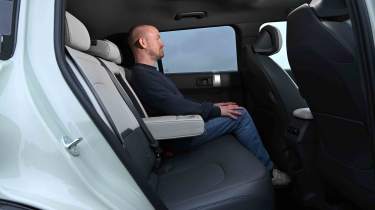
Boot space
A 460-litre boot capacity is impressive for a car in this class, and when the boot floor is raised to its higher position, it creates a level area from the opening right through to the rear seat backs when they’re folded flat. With them down, the overall volume climbs to 1,250 litres.
Its biggest rival, the Skoda Elroq, doesn’t get a nifty variable-height boot floor as standard (it is part of the £250 transport package), but it does have a much lower boot lip height, according to our testing: 700mm for the Elroq and 750mm for the EV3. The Elroq does offer a bigger boot, at 470 litres with the seats up and a massive 1,580 litres when the rear seats are folded.
The EV3 has an additional 25 litres of storage space under the bonnet. That means it is possible to store the Kia’s charging cables separately from the rest of your luggage, which we think is a better solution than in the Elroq, where you put them in a pouch under the parcel shelf, which is likely to drip on top of your belongings if the cables are wet.
"Anyone looking to tow with a Kia EV3 will be disappointed because it can only handle up to 1,000kg, and isn't available with four-wheel drive for a bit of extra traction on damp grass camp sites. The Volvo EX30 is available with four driven wheels, and can lug up to 1,600kg." – Max Adams, online reviews editor
Reliability & safety
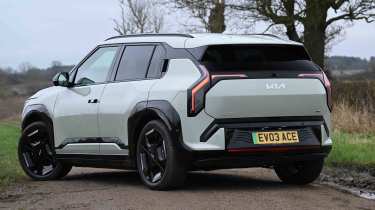
| Pros |
|
| Cons |
|
Kia finished third overall in our 2024 Driver Power customer satisfaction survey. Owners loved their cars’ infotainment tech, value for money, running costs and practicality, which are all characteristics that the EV3 should be able to deliver on.
The EV3 has received two ratings from Euro NCAP based on whether the car comes with or without the Safety Pack, which includes a more advanced emergency braking system that better recognises if you’re likely to cross into the path of an oncoming vehicle. For cars without, the EV3 is a four-star car, while those with get the maximum five-star rating. Even with a five-star rating, the Volvo EX30 did better in all areas, while the Ford Explorer did better in the adult occupant, child occupant, and vulnerable road user categories.
All UK EV3s come very well equipped with safety assistance technology, including blindspot assistance, adaptive cruise control, lane keep assistance with lane centring technology, rear cross traffic alert, and a safe exit system that works with blindspot monitoring to help prevent you from opening your door into the path of oncoming vehicles such as cyclists.
At the top of the range, the GT-Line S model adds some innovative tech, such as remote parking, where you can get out of the car and guide it into or out of a parking space while standing next to the car. This model is also the only version to get a 360-degree camera system and parking collision avoidance.
| Euro NCAP safety ratings | |
| Euro NCAP safety rating | 4-stars (5-stars with Safety Pack) Euro NCAP, 2025 |
| Adult occupant protection | 83% |
| Child occupant protection | 84% |
| Vulnerable road user protection | 77% (78%) |
| Safety assist | 67% (78%) |
Buying and owning
Best buy: Kia EV3 81.4kWh GT-Line
While the entry-level Air trim provides all the basics you’d need and is perfect for short urban commuting, we’d recommend the mid-range GT-Line trim. It features a slightly more comfortable driver’s seat with electric adjustment and lumbar support, as well as a handy wireless phone charging pad. This trim level also has better residual values than the entry-level Air. We’d also say that the larger capacity 81.4kWh battery might be a more desirable option come resale time because it has a bit more range for those looking to drive long distances every so often.
The EV3 is available with a three-year/ 30,000-mile service plan, which costs around £420 at the time of writing. This sum can either be paid in full up front, or interest-free over the course of 10 months.
Kia EV3 alternatives
The size of the Kia EV3 means it’s difficult to pigeonhole it against rivals. There aren’t many compact electric SUVs at this price point, with most alternatives being smaller and with a shorter range. Cars that match its configuration include the Cupra Born, Skoda Elroq, and Volkswagen ID.3 – all of which use the same running gear. More premium options include the Alfa Romeo Junior, Jeep Avenger and Volvo EX30, while the Renault Megane E-Tech is also worth looking at. The EV3’s price point means it covers the Ford Puma Gen-E and entry-level versions of the Ford Explorer, too.
Key updates of the Kia EV3 review
13 January 2026: Updated to reflect the increased expensive car supplement threshold and mention the proposed pay-per-mile tax for EVs from 2028.
Deals on the Kia EV3 and alternatives
Kia EV3 pictures
Frequently Asked Questions
As with the rest of the Kia line-up, the EV3 comes with the company’s market-leading seven-year/100,000-mile warranty.

